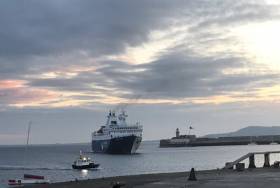Displaying items by tag: Antarctic Visitor
A cruiseship with an international ice class rating of 1B and regarded as one of the strongest ships operating in Antarctica has made a maiden call to Dun Laoghaire Harbour today, writes Jehan Ashmore.
Operated by Albratros Expeditions which describes the 12,798 gross tonnage ship as having a high maneuverability capability, a shallow draft (5.8m) and strong engines allowing for extended voyages into isolated fjords, creating exciting adventures for any Antarctica traveler.
An integral part of any such polar-cruise are shore landings at penguin rookeries and to research stations and other Antarctic wonders which are made possible by the ship's fleet of 20 Zodiacs. Among the facilities are several lecture halls, a restaurant serving 4-star international cuisine, bars and observation platforms. In addition there's even a sauna and swimming pool.
Despite its main geographical trading area, Ocean Atlantic's arrival to Dun Laoghaire Harbour followed warmer climes with a previous call to Las Palmas on Gran Canaria, Canary Islands.
The inaugural call of the cruiseship and a new client to the Irish port is a welcome boost for Dun Laoghaire-Rathdown County Council which was transferred to the local authority from the harbour company last year. Afloat will have more to report on this first of two calls to the port this week.
The occasion follows the launch of the season to the east coast port on Dublin Bay where much larger cruiseship, Norwegian Pearl with a much deeper draft (8.5m) which went to anchorage offshore. This took place this day a fortnight ago.
Incidentally, today, the Norwegian Cruises cruiseship with 2,394 passengers and 1,087 crew called to neighbouring Dublin Port and will remain overnight in the capital while berthed alongside Ocean Pier. As for Ocean Atlantic, the capacity cruiseship which has almost 200 passengers and a crew of 105 arrived to Dun Laoghaire this morning requiring a pilot cutter from Dublin Port and is scheduled to depart in the late afternoon. The next port of call is Port Ellen, Islay on the Scottish west coast.
The small ship has a rather angular appearance and dating to the Soviet era when launched as Konstantin Chernenko. Over the past three decades the 140m cruiseship has served subsequent owners and names and was renovated as recently in 2016.
A notable feature to be found on the cruiseship's starboard side is a vehicle ramp though this is obsured from view in Dun Laoghaire while berthed at the Carlisle Pier. Afloat will also have more about this feature.





























































